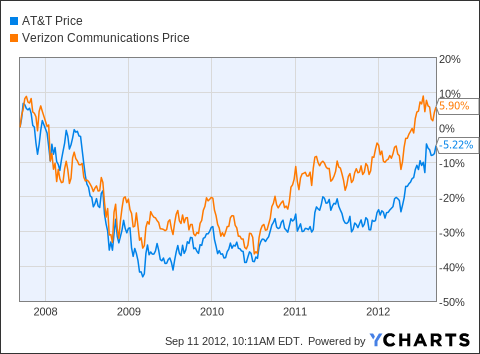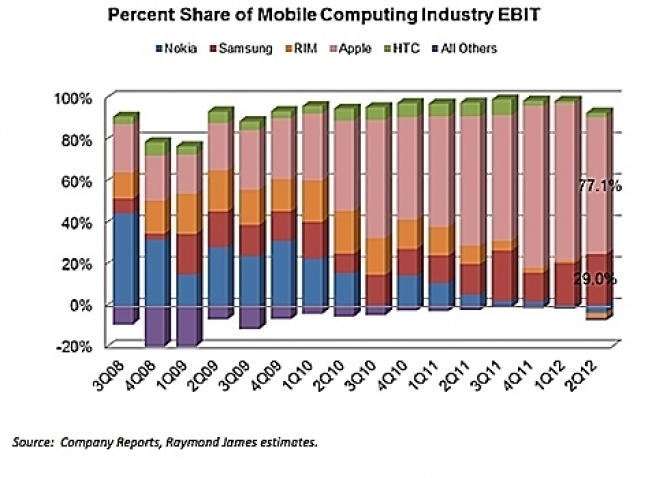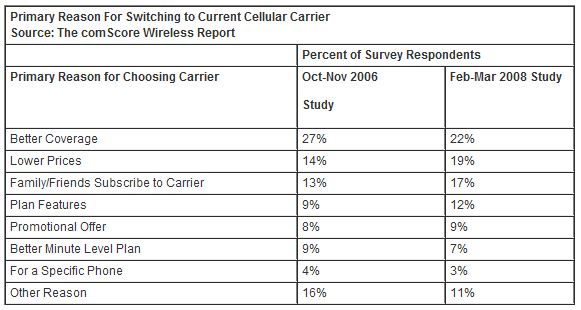13 September 2012
Mobile Operators should be quite happy with 2012.. it is turning out to be a good year for them. Wireless data revenues are climbing by around 20% YoY and 4G phones are just coming to market. This means your LTE investments should really start to pay off (if you get your data plans right). Motorola indicated that median usage of a 4G device is 11x more than a 3G device – 89MB/ day vs. 8 MB/ day. Also, 4G users are 62% more likely to check their phones than their 3G counterparts… As Jim Patterson notes, more checks mean more opportunities to display an ad. If you can establish that business.
In 2Q2012, AT&T had 69.6 million postpaid customers driving. Operating income margin of 30.3 percent; EBITDA service margin of 45 percent. Wireless data revenues rose by $1.0 billion, or 18.8 percent, from the previous year, to $6.4 billion
For same quarter Verizon had 94.2 million total retail wireless customers, with a 7.3 percent year-over-year increase in wireless revenues; Data revenues were $6.9 billion, up $1.1 billion – or 18.5 percent; 30.8 percent operating income margin and 49.0 percent segment EBITDA margin
Apple – A Faustian Bargain?
Eating 50% of the cost of a new iPhone will certainly help wireless data growth, but will MNOs develop any other business that can take advantage of this investment? Raymond James analyst Tavis McCourt shows that Apple (AAPL) is expanding its share of profits generated by the mobile industry to 77% in the second quarter of 2012, while also accounting for 43% of its total revenues.
I may be naïve, but I don’t see Apple as the 800lb Gorilla eating everyone else’s lunch. I see Apple as a company executing against a strategy focused on delivering exceptional customer experiences with a solid brand and a fantastic product. Apple is successfully monetizing an environment they control: iTunes, Apps, iOS, iCloud, iPhone, Mac, … They didn’t start with a “control” strategy.. they started with by delivering customer value (and did not go out of their way ease switching costs).
A Strategic Guide to MNO Investment
MNOs, why do customers choose you? This question more than anything else should frame your strategy. Investments in LTE certainly align here, as faster bandwidth improves a key customer requirement and enhances your core revenue.
However, it should be no surprise that consumers don’t want to use your applications and services… your indigenous applications, or your approval (ex control over apps allowed) is not part of their buying decision (except in a negative context). Customers believe that Apple, Google, RIM, … create the platform.. and hold them accountable for delivering value. Customers want freedom to choose how the device works. They make this decision usually before they enter your stores.
These “platforms” will dominate the world much beyond what we witnessed in WINTEL. There is a unique convergence between the mobile and physical world: consumers interaction time, global penetration, portability, connectivity…. The most substantial business impact we have seen due to this convergence (last 5 years) is impact to retail profit margins ( price transparency while shopping – see showrooming). The ability for consumers to check price in the store has been a key driver of retail margin compression, which has decreased from 4.2% in 2006 to 2.4% in 2010 (ref: IMAP’s Retail Industry Global Report 2010).
Even if MNOs could develop applications and services of the quality seen in the core platforms, or by small start ups, MNOs cannot possible coordinate and interconnect at the speed and scale of the platform providers. Google and Apple are quickly moving beyond isolated applications and into the cloud, thereby further accelerating their roles as Orchestrators of Value (See Blog – Stage 4 Value Shift).
MNO opportunities
I’m running out of time here.. need another cup of coffee .. may come back and polish this up. But here are the top areas I see
#1 Empty Space – Mobile Advertising
Leverage your assets in physical distribution, network ownership and consumer PII to reach well beyond anything google could provide. Mobile operators, you have data Google could only dream about… from ISP information (everything done in the mobile browser), to location, to direct customer billing agreements. You could target advertising like no other entity in the world.. plus you now have great 4G assets to deliver unbelievable content.
Mobile advertising is fundamentally broken. There is no one executing well here.. its because this space should belong to you. Go at this strong, hire a strong exec CEO and be willing to pay through the nose for a team comprised of less than 10% industry insiders. This is an advertising company.. not a mobile operator division. If done correctly, the revenue here will dwarf your mainline business in 3-5 yrs. I’ll be glad to quit what I’m doing and run it for you…
#2 Mobile – Physical connection
See my blog KYC $5B Opportunity. Many current businesses (finance, advertising, payments, …) require a physical touch with customer. In emerging markets we see telecom sales “agents” taking on licenses of bank/MSB agents so they can certify documents and take role in opening new accounts. I can tell you first hand as the exec running Citi’s remote channels globally I would love for VZ/Vodafone to take on a role in opening accounts. Additionally, think of the mobile phone operating as a form of digital signature for any type of business.. Or working to complete the biometric locks of Apple/Google/.. with an process that includes non repudiation and physical identification (VZ employee taking and witnessing the biometric registration).
I could think of many more that include Opt In/Opt out for advertising, ticket pick up, virtual concierge, or a cool and hip genius bar (renamed of course) where people are welcome to experiment with all the cool new apps and phones in your store… changing your store “experience” from volume dumb pipe and appliance sales.
#3 Service provider role
The first 2 were “leading roles”, this is “supportive”. Take a look at how your phones are used in the real world, particularly in business. Create customer experience teams. How could your MNO support the business processes of others? In healthcare? In retail? In Airline/travel?
Take healthcare for example, although we have HIPAA, we still have few digital records agents. What could be done here?
You need a complete rework of your partnership strategy. Most MNOs have a model in partnership: buy exclusive rights.. Example is VZ’s deal to sell search to MSFT for $550M in 2009. This model deal continues to be the starting point in most discussions. Change happens rather fast in this industry, exclusive deals also don’t take consumer preferences into account. You must reworks your partnership strategy, away from a control mentality. Focus first on what the consumer wants.. how can you best support it? That can’t be radical… ??
#4 Business wireless
When I go to top 20 retailers to talk about mobile.. their immediate response is: “how do we stop it”? How can MNOs help retailers enhance their business?




Pingback: Future of Phones.. Good Enough? « FinVentures
Several industry anyaslts predict that mobile applications will gradually move to the cloud, and move away from being installed and run directly from the handsets themselves. Instead, apps will be accessed and executed directly from the cloud through a mobile web browser interface. Several technologies facilitating this change are already available. HTML5, for example, is necessary for enabling caching on the handset, so that users will experience uninterrupted service levels despite fluctuations in network service delivery. 4G mobile networks, like LTE and WiMAX, are fundamental for supporting large-scale mobile cloud deployment. These networks are already being deployed in several cities and small regions and are expected to obtaina0significant adoption rates in the coming years.